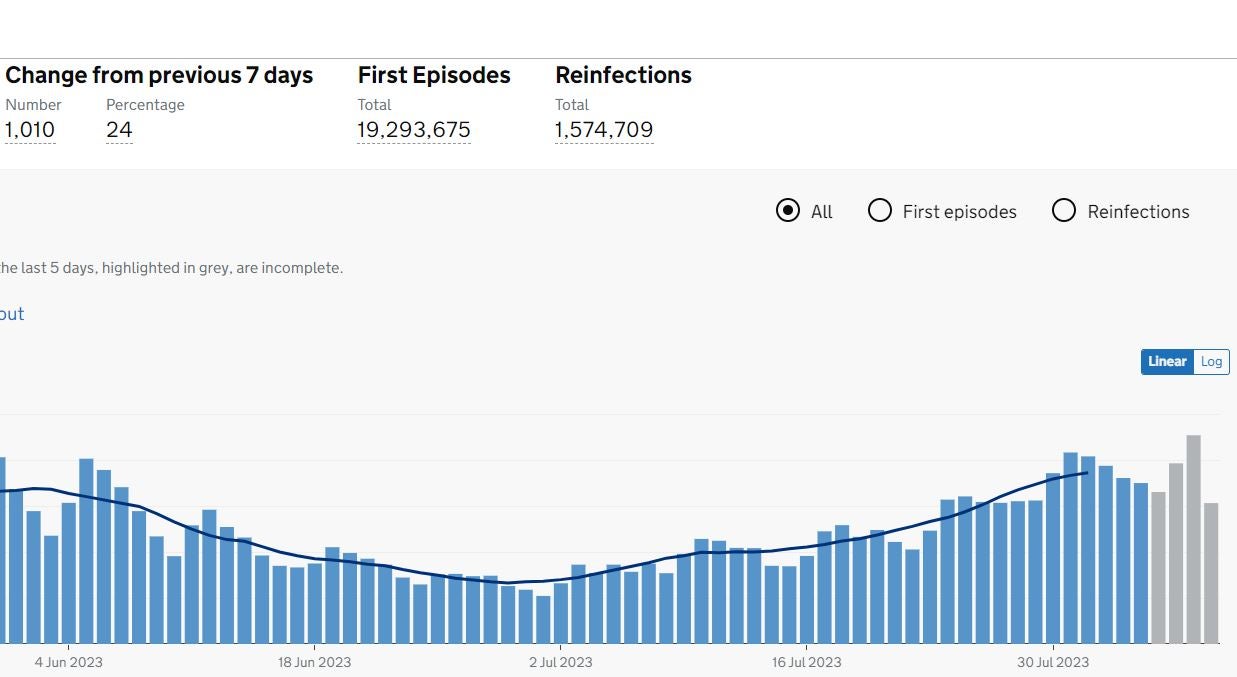New Covid wave has begun and masks should be worn again, scientists warn
Spread of new variant could cause extreme pressure on NHS and cause more damaging long-term health problems, Independent Sage expert says
Experts have warned it is “reasonably certain” the UK is in another wave of Covid-19 – and suggested people should wear face masks again.
Hospital admissions for coronavirus have risen in recent weeks, just as the effectiveness of vaccines is wearing off, a new variant has emerged and ministers have decided Covid boosters will not be offered to nearly 12 million Britons this winter.
“Without ramping up surveillance, and in the face of waning immunity, we are travelling into winter more vulnerable and with blinkers on,” warned Christina Pagel, a member of the Independent Scientific Advisory Group for Emergencies that advises on the virus.

Prof Pagel predicted the new wave could cause extreme pressure on the health service, with a repeat of last winter’s “unprecedented” NHS crisis of Covid, flu and respiratory virus that came all around the same time.
“Any increase in hospital burden is bad news, given record waiting lists for diagnosis and treatment and persistently high waits in hospitals for admission,” she wrote in the British Medical Journal.
“Infection is also not harmless simply because it’s causing fewer hospital admissions – long Covid remains an ongoing significant problem, damaging people’s lives (eg through persistent fatigue or brain fog), as well as taking them out of the workforce.”
And she warned that a new variant very different from previous strains could make “hard-won protection much less protective”.
Dr Trisha Greenhalgh, a University of Oxford healthcare expert and also iSage member, wrote on social media: “My various science WhatsApp groups are buzzing… I understand little of the detail but it looks like it’s once again time to MASK UP.”
Asked whether people should wear them again, she added: “In high-risk situations I personally would wear one, yes. More to the point, I’m currently AVOIDING such situations eg not going to cinema.”
The new Covid variant, Eris, emerged this summer as hospital admissions rose and estimated numbers of people with Covid jumped by almost 200,000 last month.
A descendant of Omicron, Eris, or EG.5.1, now accounts for between 10 per cent and 16.74 per cent of cases, and is the second-most prevalent strain in the UK, according to the UK Health Security Agency (UKHSA).
Prof Pagel pointed out under-50s have not had a vaccine for 18 months, and most under-75s for a year.
She wrote: “Protection from previous infection will also be waning in the absence of a large wave for several months.
“It is thus likely that this wave is hitting a more susceptible population than the last few, and this might be enough to drive a large wave this September when coupled with return to school and work and more time spent inside, where the virus spreads most easily.”

There are no signs that Eris is more dangerous than other variants.
But Prof Pagel warned: “Given few, if any, mitigations worldwide and much lower surveillance, such a variant could spread a long way before we realised it was a problem.”
She also raised the alarm over a new – as yet unnamed – variant with many new mutations, detected in Israel and Denmark. It might fizzle out, but people are more vulnerable now, she said.
There are few ways to track the prevalence of Covid-19 in England since the end of wastewater monitoring last March, the end of Office for National Statistics Covid-19 survey in March this year, and gradual reduction of testing in hospitals.
Around 7 July, cases were thought to have fallen to their lowest since the summer of 2020. However, since the start of last month, daily hospital admissions have risen, and on 4 August were more than double the figure four weeks earlier.
On that date, the 1,802 patients admitted in the previous seven days represented a rise of 366 on the week before – a 26 per cent increase.
In all, 1,844 Covid patients were in hospital, in an increase thought to be driven partly by more social mixing indoors during wet weather.
This article was amended on 17 August 2023. It originally referred to the scientists as members of the official government advisory group, Sage, but this was incorrect. They are in fact members of Independent Sage, which is a group of scientists offering public advice on Covid-19.
Join our commenting forum
Join thought-provoking conversations, follow other Independent readers and see their replies
Comments


Bookmark popover
Removed from bookmarks